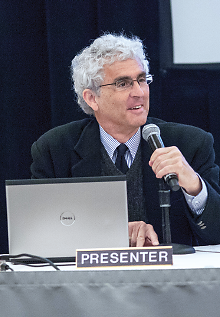APA wants to ensure that the new edition of its Diagnostic and Statistical Manual of Mental Disorders (DSM-5) is a “living document” that can be updated as research developments warrant. Last May, APA President Jeffrey Lieberman, M.D., appointed the Work Group on the Future of DSM to craft a system for making incremental changes to the manual.
At last month’s meeting of the APA Board of Trustees, the work group’s chair, former APA President Paul Appelbaum, M.D., presented a framework for assessing and incorporating deletions, additions, and criteria changes to DSM, which the Board accepted.
Among the key principles guiding the process is that “stability of psychiatric diagnosis is a good thing,” Appelbaum emphasized. But advances that do alter clinical practice should not have to wait for the next revision of the manual, as has been the case with past DSM editions. Now, with the capabilities that come with online publishing, a mechanism for timely revisions exists.
The review process for suggested changes, he noted, would be overseen by a steering committee that reports to the Board of Trustees through the Council on Research. Committee members would have “expertise in psychiatric nosology, psychiatric research, clinical psychiatry, and the DSM” and would not be limited to APA members. The committee members would also be a source of suggestions for diagnostic categories that might warrant revision, as would psychiatric researchers, clinicians, or specialty or advocacy organizations, Appelbaum said.
The work group also recommended that the DSM-5 website be expanded to include a section to “allow interested parties to submit concerns about current criteria or proposals for new criteria or disorders. The website could also be a means of promoting the transparency of the revision process by providing the public with a list of proposals that are being developed by appointed working groups.”
A small number of review committees would be appointed in major areas of psychopathology to draft proposed revisions once the proposals receive Steering Committee approval. When one of the review committees completes a “close-to-final” draft of criteria changes, the draft would be posted on the website for public comment. And the comments would then go back to a review committee.
“As changes to diagnostic criteria and text are approved by the Board of Trustees, they will be reflected in the online edition of DSM, with an electronic mechanism to flag changes for users,” the work group suggested. “Periodically, perhaps every five years, the interim changes will be incorporated into a new DSM edition (e.g., DSM-5.1), which will be published in hard copy.”
A work group on another critical issue in psychiatry—health care reform—also reported at the Board meeting. Howard Goldman, M.D., chair of the Health Care Reform Strategic Action Work Group, said the work group is nearing completion of two Medicaid-related toolkits. One describes the opportunities and risks of managed approaches to care in state Medicaid plans, and the other toolkit describes strategies psychiatrists can use when working with state advocates seeking to amend state Medicaid plans affecting people with mental illness.
Goldman said that the work group is also nearing completion of a white paper that will provide an overview of quality measures and how they will affect psychiatric practice as the health care system evolves.
Other Actions
In other actions it took at its March meeting, the Board of Trustees voted to:
•
Join several other medical societies in endorsing the nomination of Vivek Murthy, M.D., to be the next U.S. surgeon general. Murthy is a hospitalist at Brigham and Women’s Hospital in Boston and Harvard Medical School and co-founded Doctors for America, an organization of physicians and medical students that advocates for access to affordable, quality health care. After being nominated by President Obama, he was approved by a key Senate committee, but last month his nomination ran into trouble when Republicans mounted opposition based on Murthy’s strong support of the Affordable Care Act, and the powerful National Rifle Association vowed to sink the nomination because of his strong support of gun-control legislation.
•
Appoint a work group to, with the assistance of APA staff, “evaluate options regarding [APA] endorsement of liability insurance companies.”
•
Change the name of two APA components. The Council on Global Psychiatry will become the Council on International Psychiatry, and the Caucus on Alternative and Complementary Medicine will become the Caucus on Complementary and Alternative Medicine, to mirror terminology used by the NIH, which has a center studying this issue. ■


